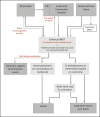Impact of 'Enhanced' Intermediate Care Integrating Acute, Primary and Community Care and the Voluntary Sector in Torbay and South Devon, UK
- PMID: 35282155
- PMCID: PMC8855731
- DOI: 10.5334/ijic.5665
Impact of 'Enhanced' Intermediate Care Integrating Acute, Primary and Community Care and the Voluntary Sector in Torbay and South Devon, UK
Abstract
Introduction: Intermediate care (IC) was redesigned to manage more complex, older patients in the community, avoid admissions and facilitate earlier hospital discharge. The service was 'enhanced' by employing GPs, pharmacists and the voluntary sector to be part of a daily interdisciplinary team meeting, working alongside social workers and community staff (the traditional model).
Methods: A controlled before-and-after study, using mixed methods and a nested case study. Enhanced IC in one locality (Coastal) is compared with four other localities where IC was not enhanced until the following year (controls), using system-wide performance data (N = 4,048) together with ad hoc data collected on referral-type, staff inputs and patient experience (N = 72).
Results: Coastal showed statistically significant increase in EIC referrals to 11.6% (95%CI: 10.8%-12.4%), with a growing proportion from GPs (2.9%, 95%CI: 2.5%-3.3%); more people being cared for at home (10.5%, 95%CI: 9.8%-11.2%), shorter episode lengths (9.0 days, CI 95%: 7.6-10.4 days) and lower bed-day rates in ≥70 year-olds (0.17, 95%CI: 0.179-0.161). The nested case study showed medical, pharmacist and voluntary sector input into cases, a more holistic, coordinated service focused on patient priorities and reduced acute hospital admissions (5.5%).
Discussion and conclusion: Enhancing IC through greater acute, primary care and voluntary sector integration can lead to more complex, older patients being managed in the community, with modest impacts on service efficiency, system activity, and notional costs off-set by perceived benefits.
Keywords: admission avoidance; early supported discharge; intermediate care; multi-disciplinary teams; person-centred care; voluntary sector.
Copyright: © 2022 The Author(s).
Conflict of interest statement
This evaluation was part-funded by Torbay and South Devon NHS Foundation Trust (TSDFT), where the Researchers-in-Residence (Julian Elston and Felix Gradinger) are based. Both researchers are employed by Plymouth University. Matt Fox is a GP and Locality Clinical Lead for Coastal locality and Locality Clinical Director at TSDFT. Louise Dawson is Community Services Manager for Coastal locality and Dawn Butler is Deputy Director of Strategy, Performance and Planning at TSDFT. Professors Sheena Asthana and Richard Byng have no conflict of interest.
Figures





Similar articles
-
Systematic reviews of the effectiveness of day care for people with severe mental disorders: (1) acute day hospital versus admission; (2) vocational rehabilitation; (3) day hospital versus outpatient care.Health Technol Assess. 2001;5(21):1-75. doi: 10.3310/hta5210. Health Technol Assess. 2001. PMID: 11532238 Review.
-
How has the impact of 'care pathway technologies' on service integration in stroke care been measured and what is the strength of the evidence to support their effectiveness in this respect?Int J Evid Based Healthc. 2008 Mar;6(1):78-110. doi: 10.1111/j.1744-1609.2007.00098.x. Int J Evid Based Healthc. 2008. PMID: 21631815
-
Surgical intensive care - current and future challenges?Qatar Med J. 2020 Jan 13;2019(2):3. doi: 10.5339/qmj.2019.qccc.3. eCollection 2019. Qatar Med J. 2020. PMID: 31976309 Free PMC article.
-
The impact of a new emergency admission avoidance system for older people on length of stay and same-day discharges.Age Ageing. 2014 Jan;43(1):116-21. doi: 10.1093/ageing/aft086. Epub 2013 Aug 1. Age Ageing. 2014. PMID: 23907007
-
Early discharge hospital at home.Cochrane Database Syst Rev. 2017 Jun 26;6(6):CD000356. doi: 10.1002/14651858.CD000356.pub4. Cochrane Database Syst Rev. 2017. PMID: 28651296 Free PMC article. Review.
Cited by
-
Factors influencing the implementation of early discharge hospital at home and admission avoidance hospital at home: a qualitative evidence synthesis.Cochrane Database Syst Rev. 2024 Mar 5;3(3):CD014765. doi: 10.1002/14651858.CD014765.pub2. Cochrane Database Syst Rev. 2024. PMID: 38438114 Free PMC article.
-
New models of health and social care for people in later life: mapping of innovation in services in two regions of the United Kingdom using a mixed method approach.BMC Health Serv Res. 2024 Jul 15;24(1):812. doi: 10.1186/s12913-024-11274-8. BMC Health Serv Res. 2024. PMID: 39004735 Free PMC article.
-
Evaluating step-down, intermediate care programme in Buckinghamshire, UK: a mixed methods study.BMC Public Health. 2023 Jun 6;23(1):1087. doi: 10.1186/s12889-023-15868-5. BMC Public Health. 2023. PMID: 37280556 Free PMC article.
-
Virtual wards for people with frailty: what works, for whom, how and why-a rapid realist review.Age Ageing. 2024 Mar 1;53(3):afae039. doi: 10.1093/ageing/afae039. Age Ageing. 2024. PMID: 38482985 Free PMC article. Review.
-
Volunteer-supported Care Transition Interventions for People Living with Dementia: A Secondary Analysis of a Scoping Review.Int J Integr Care. 2025 May 21;25(2):16. doi: 10.5334/ijic.9056. eCollection 2025 Apr-Jun. Int J Integr Care. 2025. PMID: 40417708 Free PMC article.
References
-
- Coffey A, Leahy-Warren P, Savage E, Hegarty J, Cornally N, Day MR, Sahm L, O’Connor K, O’Doherty J, Liew A, Sezgin D, O’Caoimh R. Interventions to Promote Early Discharge and Avoid Inappropriate Hospital (Re)Admission: A Systematic Review. International Journal of Environmental Research and Public Health. 2019; 16(14): 2457. DOI: 10.3390/ijerph16142457 - DOI - PMC - PubMed
-
- Department of Health. National Service Framework for Older People. Modern Standards and Service Models. London: Department of Health; 2001. [cited 2021 16 November]. Available from: https://assets.publishing.service.gov.uk/government/uploads/system/uploa....
LinkOut - more resources
Full Text Sources

